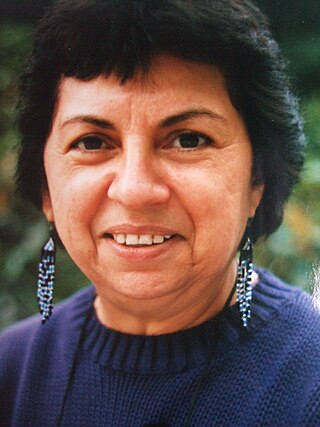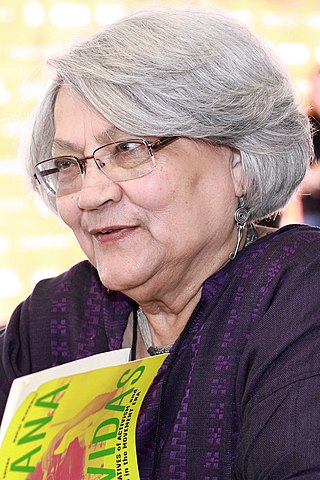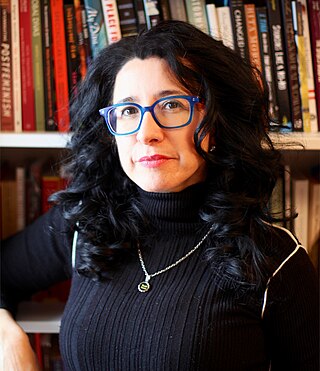
Tejano music, also known as Tex-Mex music, is a popular music style fusing Mexican influences. Its evolution began in northern Mexico.

Sandra Cisneros is an American writer. She is best known for her first novel, The House on Mango Street (1983), and her subsequent short story collection, Woman Hollering Creek and Other Stories (1991). Her work experiments with literary forms that investigate emerging subject positions, which Cisneros, herself, attributes to growing up in a context of cultural hybridity and economic inequality that endowed her with unique stories to tell. She is the recipient of numerous awards, including a National Endowment for the Arts Fellowship, was awarded one of 25 new Ford Foundation Art of Change fellowships in 2017, and is regarded as a key figure in Chicano literature.

Gloria Evangelina Anzaldúa was an American scholar of Chicana feminism, cultural theory, and queer theory. She loosely based her best-known book, Borderlands/La Frontera: The New Mestiza (1987), on her life growing up on the Mexico–Texas border and incorporated her lifelong experiences of social and cultural marginalization into her work. She also developed theories about the marginal, in-between, and mixed cultures that develop along borders, including on the concepts of Nepantla, Coyoxaulqui imperative, new tribalism, and spiritual activism. Her other notable publications include This Bridge Called My Back: Writings by Radical Women of Color (1981), co-edited with Cherríe Moraga.

Norma Elia Cantú is a Chicana postmodernist writer and the Murchison Professor in the Humanities at Trinity University in San Antonio, Texas.

Chicana feminism is a sociopolitical movement, theory, and praxis that scrutinizes the historical, cultural, spiritual, educational, and economic intersections impacting Chicanas and the Chicana/o community in the United States. Chicana feminism empowers women to challenge institutionalized social norms and regards anyone a feminist who fights for the end of women's oppression in the community.
Nora Chapa Mendoza is a Texas-born artist. She has been named Michigan Artist of the Year and in 1999 she received the Governor's Arts Award. In 1996, she was one of eight artists that participated in the renovation of Detroit's Music Hall.

Martha P. Cotera is a librarian, writer, and influential activist of both the Chicano Civil Rights Movement and the Chicana Feminist movement of the 1960s and 1970s. Her two most notable works are Diosa y Hembra: The History and Heritage of Chicanas in the U.S. and The Chicana Feminist. Cotera was one of six women featured in a documentary, Las Mujeres de la Caucus Chicana, which recounts the experiences of some of the Chicana participants of the 1977 National Women's Conference in Houston, Texas.
Frances Esther Karttunen, also known as Frances Ruley Karttunen, is an American academic linguist, historian and author.

Deborah Paredez is an American poet, scholar, and cultural critic. She is the author of the poetry collections, Year of the Dog and This Side of Skin, and the critical study, Selenidad: Selena, Latinos, and the Performance of Memory. She is co-founder of CantoMundo, a national organization that supports Latinx poets and poetry. She lives in New York City where she is a professor of creative writing and ethnic studies at Columbia University.
Malinchism is a form of attraction that a person from one culture develops for another culture, a particular case of cultural cringe. It has been described as an ethnic inferiority complex or national self-hatred. The term is used in Latin America, and especially in Mexico, to refer to the development of an admiration for the culture, ideas, behaviors, and lifestyle of the United States over those that are homegrown.
Aurora Estrada Orozco was a Mexican-American community leader and writer.

Carmen Tafolla is an internationally acclaimed Chicana writer from San Antonio, Texas, and a professor emerita of bicultural bilingual studies at the University of Texas at San Antonio. Tafolla served as the poet laureate of San Antonio from 2012 to 2014, and was named the Poet Laureate of Texas for 2015–16. Tafolla has written more than thirty books, and won multiple literary awards. She is one of the most highly anthologized Chicana authors in the United States, with her work appearing in more than 300 anthologies.

Ire'ne Lara Silva is a Chicana feminist poet and writer from Austin, Texas. Her parents were migrant farmworkers. She has published numerous works of poetry and her short story collection won the 2013 Premio Aztlán Literary Prize. A central theme of her work is Indigenous survival and perseverance despite colonization: "let's empower ourselves with that knowledge."
Laurie Ann Guerrero is a Chicana poet from San Antonio, Texas. She was the poet laureate of San Antonio from 2014 to 2016 and the Poet Laureate of Texas from 2016 to 2017. In the fall semester of 2017, she became the first writer-in-residence at Texas A&M University San Antonio and a "fully immersed faculty member. She will teach a contemporary American woman poets course, host numerous University writing workshops and mentor students while working on her next writing project."
María Limón, born María de Socorro Limón Castro, is a Chicana writer, poet, and activist based in Austin, Texas. As a self-identified queer Tejana, Limón's writing focuses on the queer Latino experience in the Southwestern United States.
María Teresa García Pedroche is an American award winning artist and curator.
CantoMundo is an American literary organization founded in 2009 to support Latino poets and poetry. It hosts an annual poetry workshop dedicated to the creation, documentation, and critical analysis of Latinx poetry.

Emma Pérez is an American author and professor, known for her work in queer Chicana feminist studies.

Emmy Pérez is a Chicanx poet and writer originally from Santa Ana, California, United States. She was a recipient of a National Endowment for the Arts Poetry Fellowship in 2017. She has lived in the borderlands of Texas since 2000, where she has taught creative writing in college and MFA programs, as well as in detention facilities and as part of social justice projects. Her latest collective is Poets Against the Border Wall. She was also a fellow (2010–12) and organizing committee member of CantoMundo (2018–19) and is a long-time member of Macondo Writers Workshop.
Maria del Rosario "Rosie" Castro is an American civil rights activist and educator from San Antonio, Texas, who has been involved in several prominent groups, such as the Young Democrats of America, the Mexican American Youth Organization, the Committee for Barrio Betterment, and the Raza Unida Party. She is the mother of politicians Julian and Joaquin Castro.










